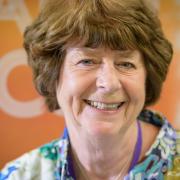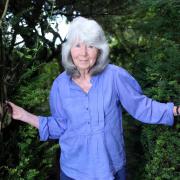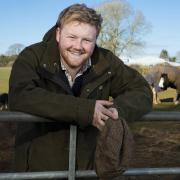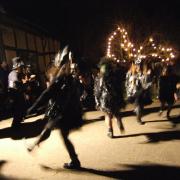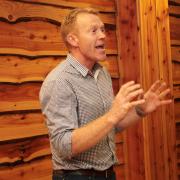‘Where is the line between sanity and insanity?’ Professor Tanya Byron asks in her fascinating book, The Skeleton Cupboard. Wherever it’s drawn, there’s insanity in how we’re currently treating our children and young people, she tells Katie Jarvis.

Come on – admit it. We’ve all been through the same family problems. Teenagers - angelic four-year-olds one minute, holding your hand and telling you you’re the best mummy in the world – now suddenly ruder than an MP on a bike. Or perhaps you’re still at the bog-eyed, sleep-deprived state peculiar to parents of toddlers whose contempt for bed is equalled only by Richard Dawkins’ feelings towards homeopathy.
Thank goodness for Professor Tanya Byron: brilliant psychologist; child-mental-health supremo; toddler tamer. Mary Poppins-meets-Sigmund Freud but in one of those cafes with great skinny lattes and a ball pool.
On TV programmes such as Little Angels and The House of Tiny Tearaways, she turned food-averse toddlers into willing eaters, transformed aggressive young biters into sound negotiators and – most importantly of all – helped screamingly end-of-tether parents to become positive praise-givers.
In the Times, she gives solace and advice to the terminally anxious: “I am very concerned for my 20-year-old nephew… who was asked to leave his sixth form college after much battling to get him to attend or to do any work.” (And, yes, haven’t we all been there.)
So life with her own family – children Lily and Jack and husband Bruce – must be a walk-in-the-park. Right?
Or maybe not. I’m sitting in a talk she’s giving – prior to interviewing her – where she’s describing 19-year-old Lily as a yelling baby, wide awake at 4am. “As I was carrying her into our bed, my husband was following behind, reading out helpful advice from a baby book,” she tells the audience. “It was one I’d written for parents.”
Or there was the time when Jack, as a toddler, had a meltdown in Brent Cross Shopping Centre - “full-on starfish tantrums. I was so worried that someone would point at me and say, ‘Isn’t that the woman off the telly?’ that my girlfriend agreed to pretend he was hers while I went off to Costa to calm down with a coffee.
“My children keep threatening to write a book called Great With Other People’s Children But S**t With Her Own.”
She’s highly entertaining, full of self-deprecating anecdotes, and sound with her advice. “Should kids be allowed computers in their bedrooms?” one parent asks. Her answer: It depends on the individual but technology needs to be accepted as an important part of their lives. (And certainly don’t believe Daily Mail “scaremongering bollocks” that computers will turn your budding Einstein into a square-eyed, non-communicative idiot.)

She tells us not to beat ourselves up for not being perfect: “There are parents who think there’s a magic answer. I think it’s quite important to get it wrong.”
All good, empathetic stuff.
But the really startling moment – the telling moment that separates Tanya Byron, sympathising fellow-parent, from trained psychologist – comes towards the end of the Q&As, when a woman from the audience asks a question; a question in violently direct contrast to the quiet-voiced, gentle tone in which she delivers it.
If your children are witness to a violent and unexpected death, she queries, how do you know they are OK?
A hush falls as Tanya starts gently probing essential facts. Was it a relative? How old are the children? Her chatty, casual demeanour has vanished; in its place is a focused, supportive clinician. It’s as if there are simply the two of them – the distraught parent; the practising clinician - alone, in this big, crowded room.
It’s a reminder that Tanya Byron, chartered clinical psychologist, has 25 years’ experience of dealing with some of the most difficult mental health cases a professional is ever likely to encounter.
And it’s also a reminder that it all began at the age of 15, when Tanya Byron walked into her grandmother’s house and discovered her battered body, splattered across the room after an unprovoked attack by a young, pregnant heroin addict wielding an iron fire-poker.
At the age of 15, Tanya Byron walked into her grandmother’s house and discovered her battered body, splattered across the room, killed by a drug addict who thought she might have cash stashed away.
“My darling father howled, but I just shut down and began to try and understand how and why,” she writes, in her bestselling book, The Skeleton Cupboard. That sickening murder helped propel her on a journey into the human mind; a quest to understand how the brain develops; how it works; how it goes wrong. If you haven’t read The Skeleton Cupboard, detailing her early training as a clinical psychologist, then you should. It’s part-Oliver Sachs, with its profound insights into human-minds-in-crisis; but it’s also the stuff of made-for-TV thrillers. There’s Ray, a violent sociopath, covered in dragon and snake tattoos, who pulls on Tanya the shining blade of a flick-knife, tracing her eye-sockets while catching her terrified tears on his fingertips. There’s Imogen, 12 years old, whom we meet hanging by her dressing-gown cord, looped over a copper pipe in the ceiling, while Tanya grabs her legs, frantically trying to halt the squeeze of asphyxiation. And there’s Harold, a research scientist, whose dementia is threatening to return his mind permanently to the horrors of Auschwitz, which he’d survived as a young man. Mollie, paper-thin and fragile, on track to get top A level grades for a place at medical school – if only she’d eat, as her loud and charming father, and her well-coiffed, reserved mother, are so desperate for her to do.

None of these people are ‘real’, in the sense that patient confidentiality and sheer humanity would preclude identifying them. But all of the situations are only-too-real: an amalgam of the cases Tanya dealt with as a young woman in her early 20s.
This is an important book, not least because, within its pages, are some of the most harrowing tales you’ll ever come across. But there’s another aspect which is unexpected and important, too: many, if not all of the cases, are focused around Tanya’s initial failings. Her failure to understand that Ray was playing with her mind; that Imogen wanted to die; that Mollie’s relationship with her parents was not what it seemed.
Did she do that on purpose? Reject an authoritarian position and expose her own vulnerabilities, instead?
“Yes, I did actually,” Tanya says. “There are some amazing books written by mental health practitioners – really excellent, ground-breaking books. But, for me, if I’m going to write about other people’s journeys from chaos to clarity, it didn’t feel right that I just presented myself, particularly at the age of 21/22, as this hugely confident, competent sort of person - particularly because I wanted to spend a lot of time implicitly and explicitly challenging the line between sanity and insanity.
“And I decided, quite early on, that I was going to talk about my grandmother’s murder because it was exactly as I said: it sort of inspired me – though that’s an odd word to use. It gets back to the idea that understanding is not condoning.”
It’s a generous thing to do: to remind us that this woman, glamorous in high heels, with a glittering media career and the highest of academic titles, is flawed, too; that, like the rest of us, she doesn’t always get it right. But it doesn’t surprise me, either. The first thing she says when we meet is “How’s your dad?” She remembered we’d had to postpone our first interview because he was in hospital.
It’s a natural empathy that clearly helps her patients as much as any book-learned, observation-based strategies. She tells me more about Harold, for example, the scientist she treated who’d survived a Nazi death camp all those years before. He was at her clinic because of his deteriorating memory: “I can’t always find the word I want. Sometimes my concentration lapses and I lose my way in a conversation. I offend people I already know, without meaning to. They think I don’t know who they are, but I do – I just can’t remember them.”
Tanya’s horror at having to condemn him to the diagnosis of dementia is only mitigated by his sympathetic understanding of her pain. Harold himself, of course, didn’t exist: “But there was a man with a very similar story who basically helped me diagnose him; he had that [scientific] research background. It was moving and I remember, at the end, saying to him, ‘I’m so sorry’. And this guy said to me, ‘I’m so glad one of the last things my competent, able brain can do is help you’. He said, ‘You do this really well; you really care’.
“I didn’t want it [my book] to be the mad people who couldn’t get anything right and didn’t know how to do things. It was also about trying to explain that, within all these people, there was something, something that they helped me with.”
If this book could be said to be a celebration of the complexities of the human mind, it’s also, in some ways, a celebration of ‘Failure’; of knowing that succeeding isn’t always the best outcome.
“Yes,” she agrees, “you do learn from success but, fundamentally, failure is your biggest life-teacher. It’s through mistakes that you ask: How can I do things differently? How can I improve? I meet a lot of children and young people who aren’t actually failing but who will perceive a failure. And you’ve got kids being tested at such an early age.”
Even to get into nursery school…
“It’s ridiculous.”
Mollie, the girl in the book with anorexia, has two loving parents, an able brain, a first-class education and fantastic prospects. The conversation Tanya quotes with her is telling:
“You don’t ever worry about failing?”
“No, never.”
“Have you ever failed?”
Mollie grinned. “No, never.”
It’s a problem. While the Rotherhams and Oxfords of this world are appalling, there’s a new, equally-hidden scandal looming. “What we are seeing,” Tanya iterates, “is children who come from backgrounds where you wouldn’t predict they would break down; children of 14 or 15, highly-focused academically, from aspirational families, who are presenting with anxiety disorders. It’s almost like they are mini-executives having a burn-out.
“I’ve just spoken to Alice Thomson [of the Times] who was saying that most people they’ve done profiles on who are successful just weren’t acing it at school. My parents were told I’d never be a high flier.”
Instead of protecting children in some kind of bubble, and regarding anything other than A*s as below-par, we should be letting them go out into the world to have a go, regardless of the ‘success’ of the outcome. “It’s about experiencing life, which is shocking and tragic but actually gives you an ability to learn how to cope; and my concern is that, actually, we are removing the possibility for children to learn how to be emotionally resilient.”
Not only that, but we’ve catastrophised our thinking: if they go out, our children are going to be kidnapped/knocked down/bullied/suicidal; fuelled by a 24-hour alarmist media. We’ve got to stop it, she says, and cut our children some slack. “My youngest said to me something really interesting the other day. He said, ‘You’re so lucky. I know I wouldn’t want to grow up without technology – I can’t imagine that you didn’t have it - but you and Aunt Rine [my sister] were so lucky because, when you were out, you were out’. And it’s true. We used to go into a red phone box; three rings on the phone and my mum knew we were OK.”
She ends The Skeleton Cupboard by talking about a society in crisis. Our society. With rocketing numbers of children and young people coming through her clinic. At younger and younger ages.
“It may not be that there are more children with mental health problems,” she cautions me. “It may be we have an incredibly empowered, articulate generation who is now saying. ‘I need some help’.
But need help they do. There is anger in her voice when she explains that six percent of the total NHS mental health budget is spent on children and young people, who nonetheless make up 25 percent of the population. “50 percent of all adult mental health problems will be present by early adolescence. By the age of 22, excluding dementia, it’s 75 percent. For every £1 we spend on early mental health intervention for a child or young person, it would cost the equivalent of £84 if it was an adult with a chronic condition. And you just think: Come on! Do the maths!”
The last clear data on child and adolescent mental health problems was compiled more than a decade ago; it’s the kind of data authorities supposedly use to work out how much money should be spent and where. Yet the vital facts on which we are basing the mental well-being of a generation are incomplete; missing.
In 2008, the UK was singled out among developed nations by the United Nations Convention on the Rights of the Child for having the most hostile press towards children and young people. The UN strongly advised the Government to help change attitudes towards youngsters.
The question that haunts Tanya Byron’s book is a big one: Where does sanity end and insanity begin? It’s not an easy one to answer. But taking the mental health of our children seriously has, surely, to be one sure marker of a sane society.
• The Skeleton Cupboard: the making of a clinical psychologist by Tanya Byron (a narrative case based journey through three years of clinical training) is published in hardback by Macmillan, price £18.99; www.professortanyabyron.com
• Professor Tanya Byron was one of the speakers at Cheltenham Literature Festival, which this year runs from October 2-11; www.cheltenhamfestivals.com
This article by Katie Jarvis is from the January 2015 issue of Cotswold Life.
For more from Katie, follow her on Twitter.




